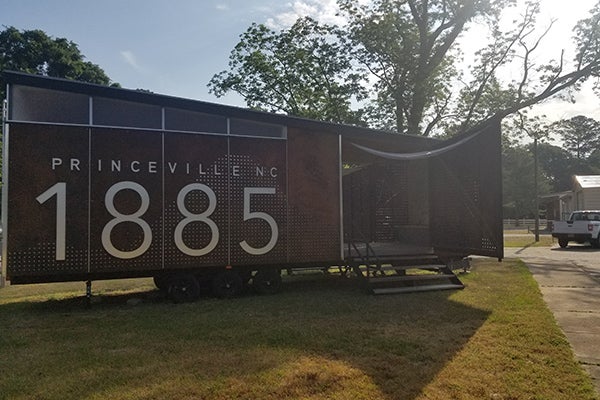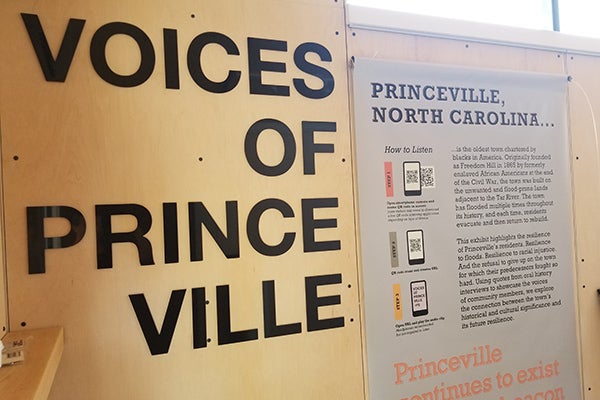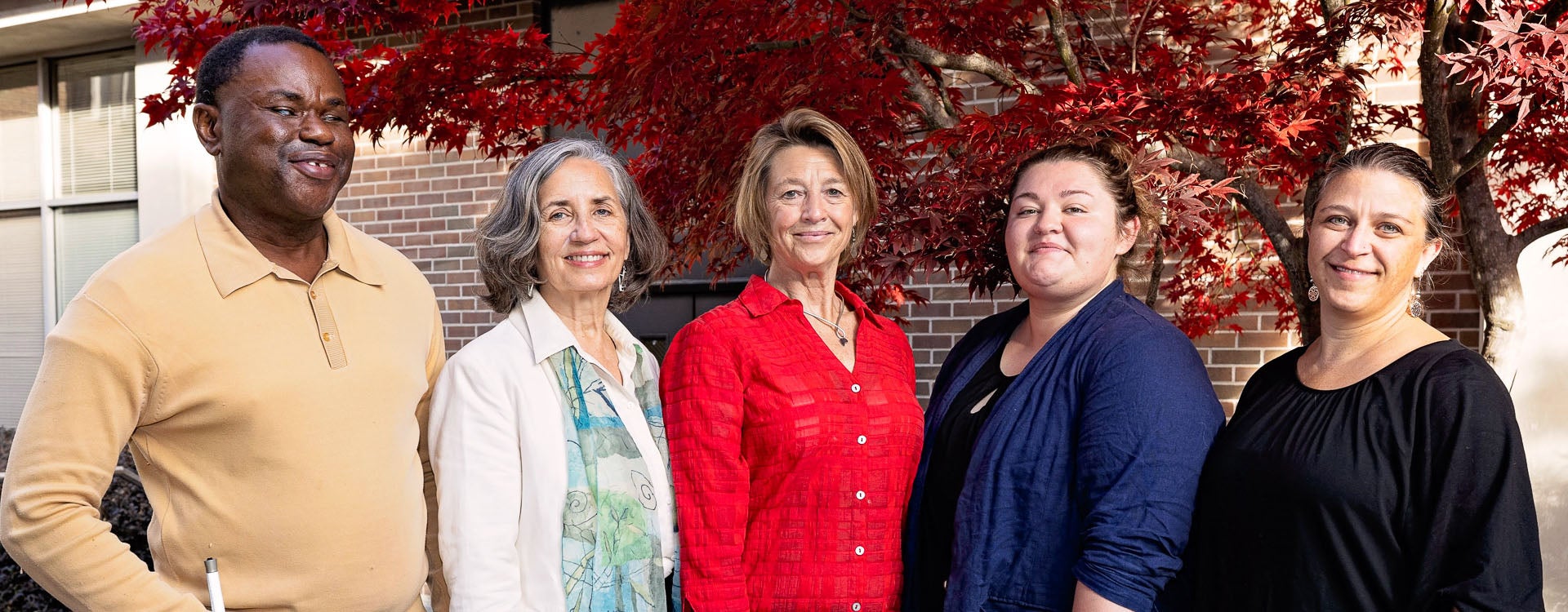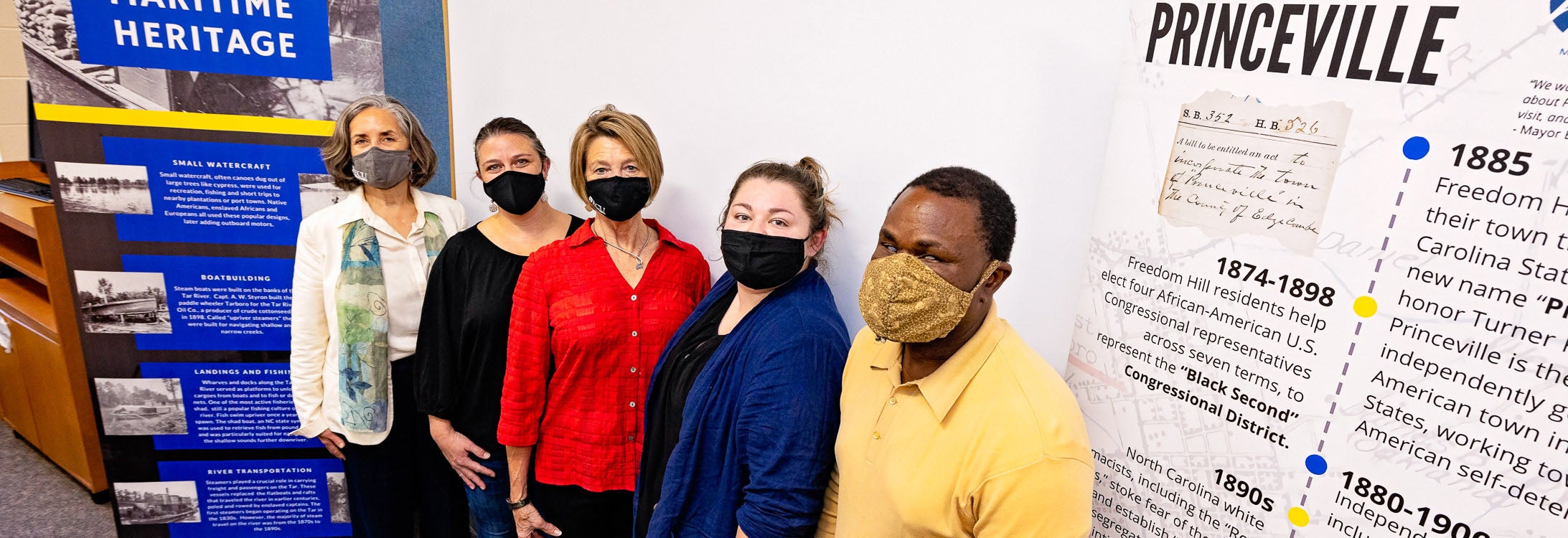NO RETREAT
Oldest African American town in U.S. preserves history amidst environmental calamities
East Carolina University faculty and students in the Thomas Harriot College of Arts and Sciences are telling the stories of Princeville, N.C. — the oldest incorporated African American town in the United States — and how residents are preserving the town’s history after devastating flooding events.
The town, originally named Freedom Hill, was founded in 1865 by formerly enslaved Africans freed after the Civil War. In 1885, the town was renamed Princeville after one of the earliest residents and carpenter, Turner Prince, who built many of the town’s structures.
Situated along the Tar River, Princeville almost was destroyed by two flooding events — Hurricane Floyd in 1999, which devastated nearly 1,000 residential structures, and then again in 2016 because of Hurricane Matthew, when 500 homes flooded. No lives were lost during either event. After Floyd, the state offered widespread buyouts of homeowners. However, the town declined the offer and opted to rebuild.

The Princeville mobile museum. (Contributed photo)
Dr. Susan Pearce, associate professor of sociology; Dr. Lynn Harris, professor of history; Dr. Mamadi Corra, professor of sociology; Dr. Cynthia Grace-McCaskey, professor of anthropology; and anthropology alumna Kayla Evans, are telling the town’s story through parallel research projects and public exhibits.
In 2019, Pearce, Harris and Corra partnered with Freedom Organization, a Princeville nonprofit, to address the need for heritage preservation and public education surrounding the historic town. The collaboration was funded by a North Carolina Humanities Council Grassroots grant.
ECU graduate students conducted interviews and archival research, and maritime studies graduate students, led by Harris, surveyed the Tar River near Princeville and at Shiloh Landing to locate, map, photograph and draw submerged artifacts possibly associated with the town’s history.
The results were presented to the public in a daylong workshop and exhibit about Princeville in ECU’s Joyner Library. Corra created Braille labels for each of the exhibit’s items, which included banners designed by Jeremy Borrelli, maritime studies staff archaeologist and ECU alumnus, that outlined Princeville’s cultural history and challenges. Exhibit materials were given to the town of Princeville for both a permanent and mobile museum, and the collaboration also resulted in a project website.
Later in 2019, Grace-McCaskey joined the team on a parallel project funded by ECU’s Engagement and Outreach Scholars Academy, in which she and her former graduate student conducted oral histories of Princeville residents to better understand community perceptions of resilience. Under Grace-McCaskey’s mentorship, Evans conducted the oral history interviews, analysis of the data and used the research to write her thesis on Princeville’s community engagement.

ECU anthropology alumna Kayla Evans conducted oral histories of Princeville residents for her graduate thesis. (Contributed photo)
“In addition to the research skills Kayla learned, in community-based projects like this one, I think students gain experience in listening and understanding the needs and goals of others,” Grace-McCaskey said. “They learn how to work with others to codesign projects that achieve both research goals as well as community goals; and that sometimes the community’s goals are more important.”
The mobile museum, currently located in Princeville, contains displays, stories and QR codes visitors may scan to listen to oral histories recorded by current and former residents.
“The work we did in Princeville helped my education by providing an opportunity to conduct field work and learn leadership skills,” Evans said.
“This project taught me the importance of working in underrepresented communities,” she added. “In the future, I plan to continue my education with the goal of performing community engaged research and applied anthropology. Whether my career path takes me to academia or public health and community action, my time working with the residents of Princeville has left a positive mark on me.”
In a continuation of the collaboration and service between ECU and Princeville’s Freedom Organization, undergraduate sociology majors in Pearce’s spring 2021 senior seminar wrote a successful grant proposal to the Kate B. Reynolds Foundation. The grant will allow Freedom Organization to hire a general operations manager, camp director and camp counselors for the next two years, to support one of Princeville’s local nonprofit organizations.
In addition, Princeville is one of the partnering communities that ECU researchers will work with under a new $5 million National Science Foundation grant. The grant proposal “Supporting Environmental Justice in Connected Coastal Communities through a Regional Approach to Collaborative Community Science,” was awarded in August to ECU’s Water Resource Center (WRC) under the principal investigation of Dr. Stephen Moysey, director of the WRC and professor of geological sciences.

Mamadi Corra, Susan Pearce, Lynn Harris, Kayla Evans and Cynthia Grace-McCaskey are preserving the history of the oldest African American town in the country (Photo by Cliff Hollis)
Related:
Building Resiliency: ECU receives $5 million to strengthen coastal communities
Princeville Community Collaborative Project
Floods come and go, but Princeville persists
